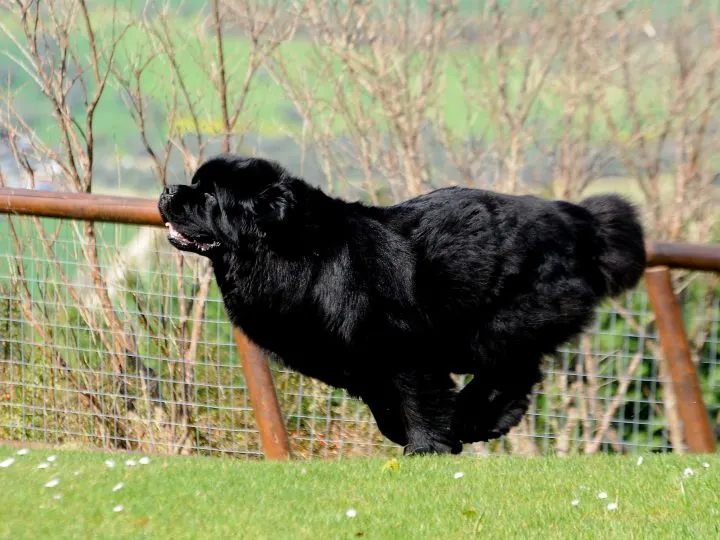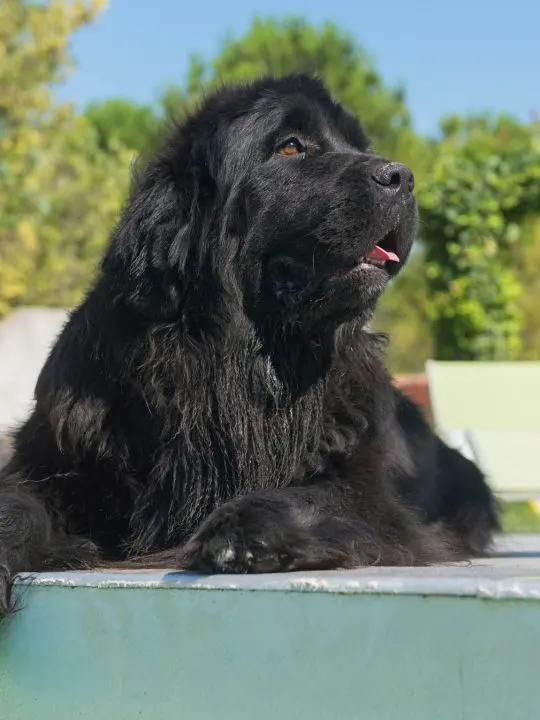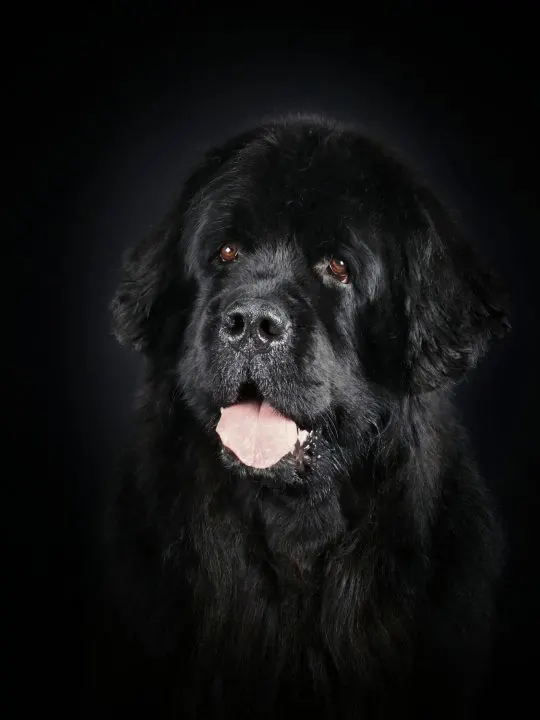Newfoundlands are considered a giant working breed.
They are a loyal breed that loves to work and be with their families.
Due to their massive size and fast growth, Newfies are a breed that is prone to developing joint problems.
While some of these joint problems might be genetic, there are several things that owners of this devoted breed can do to help keep their joints healthy and free from unnecessary injuries.
It’s important to keep in mind that joint problems seen in the Newfoundland breed can not only be caused by poor nutrition and injury but also developmental, environemtal and degenerative.
This is why it’s super important for prospective Newfie owners to do their homework before getting a Newfie and also to take the time to find a quality breeder that does regular health testing.

Some of the more common joint problems seen in the Newfie breed include:
- Arthritis
- Cruciate ligament and meniscus tears
- Elbow dysplasia
- Hip dysplasia
- Ligament, tendon, muscle injuries and disease
- Luxating patella
- OCD (osteochondritis dissecans)
- (Pano) Panosteitis
How to Tell if Your Newfoundland Is Suffering From Joint Problems
Newfies are a stoic breed so as an owner, you should always be paying close attention and get familiar with what’s normal for them and what’s not normal.
Depending on the Newfie, they can show many subtle signs that they’re having some joint pain.

Here’s a list of some of the more common signs:
- Slowing down on walks
- Limping
- Irritability
- Difficulty standing or sitting
- Bunny hopping
- Resting more
- Avoiding regular activity
- Isolation, avoiding touch
- Joint swelling
- Unusual licking of an area near a joint
- Muscle loss, atrophy
- Sudden lameness
I want to address bunny hopping really quickly because I was talking about it the other day.
A common misconception is that if a Newfie puppy is bunny hopping, it’s a sign of hip dysplasia.
It can be a sign but it’s also a normal puppy behavior-especially when they have the zoomies.
Newfie puppies grow fast and they’re uncoordinated.
They’re not going to have a smooth gait when they’re uncontrollably running around the backyard.
Every puppy that I’ve had, has bunny hopped as a puppy when they are running and none of them have had hip dysplasia. (heavily knocks on wood)
Preventing Joint Injuries During Puppyhood
Quality Breeder
If you decide to purchase a puppy from a breeder, make sure to take the time to do your research.
While even a well-planned litter may produce a puppy that has joint problems, it is not a regular occurrence.
Always make sure that the breeder you choose has done the recommended health clearances on the sire and dam.

For joints, this includes OFA or Penn Hip done on hips and elbows.
You can research this on the Newfoundland Dog Database or the OFA Database.
Passing hips scores for OFA include: Excellent, Good and Fair.
Elbows: Normal
Some breeders will also do patellas (knee).
Food
A healthy nutritional diet is the best way to start off protecting your puppy’s joints.
Hopefully, your breeder has given you all the tools and information that you’ll need in regard to feeding and supplementing your new puppy.
If you did not receive this information from your breeder, reach out to them or talk to your veterinarian.
In some cases, you might want to switch to different food, which is fine, but it’s recommended to give your puppy a few days to get used to their new home.
Protein, calcium, vitamins and minerals are vital to giant breed puppies, but only in the correct ratios.
Too much or too little can harm your puppy so make sure to choose a puppy food that supports a Newfie’s fast and long growth period.
I know you guys want me to list puppy foods, but I always try to steer clear of this because every puppy is different.

Choose a dog food that is formulated for large breed puppy growth (it doesn’t have to say giant breed) or an all-life-stages food.
Don’t overfeed and stay away from free-feeding if you can.
Newfie puppies grow fast so while it’s important that you’re getting the nutrition that they need, it’s also important to try and control their weight to avoid malformation and joint damage.
My personal view on this: Lou is on the thin side right now.
He’s not sickly skinny but he’s also not plump.
He’s getting adequate food, he’s getting the nutrition he needs.
He’s taller than he is wide and I’m fine with that.
He’s going to fill out.
Exercise
Exercise is important for Newfie puppies but many owners are unsure of what type of exercise a fast-growing puppy can do.
Puppies have small bursts of energy and sleep a lot.
Puppies that don’t burn enough energy will look for things to entertain themselves if nothing is provided.
However, too much exercise and the wrong kind of exercise can cause bone and joint issues.

Since Newfie owners are usually advised to avoid long walks on hard surfaces, many often choose not to walk their puppy.
Contrary to popular belief, it’s ok to take your puppy for short walks.
You shouldn’t be taking them for a jog or a sprint but a short controlled walk is good and should be encouraged.
It’s not about the “walk” per se, it’s what you’re doing during the walk.
We’ll get into that in another post soon!
As the puppy matures, more activity can be gradually added.
- Longer controlled walks
- Self exercise
- Controlled game of fetch.
- Swimming
- Tug
- Mental stimulation

Control Their Environment
Puppies should be raised in a controlled environment.
Common injuries to puppies can happen by:
- Falling down stairs
- Slipping on floors
- Slipping on ice
- Jumping in and out of the car or SUV
- Fast/sharp turns
- Running on hard surfaces for long periods of time
Teach your puppies to walk downstairs in a controlled manner.
Use a ramp or pet stair for vehicles.
Discourage running in the house.
I have non-slip rugs placed at every turn of each room that doesn’t have carpet.
This is for Lou and for Odin’s safety.
I also have rugs at the bottom of the stairs.
Prevent Joint Issues In Adult Newfs
Once a Newfie is done growing, around 2-3 years of age, it’s important to control their weight and continue with good nutrition.
A balanced diet, additional joint supplements, and routine exercises are ideal.

Adult Newfies, especially neutered males, are prone to becoming overweight.
The more weight they put on, the more stress on the joints.
As an owner, it is your responsibility to help your Newfoundland lose weight using dietary control and exercise.
Keep your adult Newfie lean and in shape.
Get them swimming or give them a job to do and limit their treats.
Control Their Environment
Again, it’s important to control their environment and continue to add
If you haven’t already added joint supplements to your adult dog’s diet, now is a good time to start.
When looking for a joint supplement look for one that contains:
- Glucosamine-which naturally exists in healthy joint cartilage, can help protect the cushion between the joints.
- Chondroitin helps prevent the destruction of joint tissue and helps repair damage.
You can also look for:
- Omega 3’s, the EPA and DHA in fish oil helps keep joints lubricated and prevents arthritis.
- Green-lipped mussel, a very powerful omega 3 which science has shown to decrease inflammation, protect joints, and decrease pain.
- Hyaluronic Acid Hyaluronic acid is another one that exists naturally. Its natural presence in joints adds viscosity to the joint fluid, improving shock absorption and resilience.

Popular joint supplements used by Newfie owners include but are not limited to:
- Cosequin
- Dasuquin
- Glycoflex
- The Missing Link
- Phycox
As far as giving joint supplements to large breed puppies, it’s always best to reach out to your breeder or veterinarian to see what they recommend.
I normally start giving a small amount around 6 months but you’ll get different answers depending on who you ask.
Usually by 1 year old is a safe time to start joint supplements for most Newfies.
Mature Newfies or Newfies with Injuries
Most Newfies will suffer some sort of joint pain or injury no matter how hard you try to control it.
Be prepared and continue to control their environment.
For senior Newfies, make sure they are able to get up easily from floors that aren’t carpeted.
Place non-slip rugs around the house as needed.

Keep their nails trimmed and the hair on the underneath of their paws trimmed.
If you need to, switch up their joint supplement to something stronger.
Older dogs and dogs with an injury can benefit from supplements to help decrease pain, improve mobility, help keep joints lubricated, and repair damage
In addition to glucosamine and chondroitin, some other supplements include:
- Green-lipped mussel: a powerful omega 3 which science has shown to decrease inflammation, protect joints, and decrease pain.
- MSN: reduces inflammation, reduces the breakdown of cartilage, and protects the end of joints.
- CBD oil: reduces pain, inflammation, and helps reduce anxiety.
- Tumeric: reduces inflammation and stiffness. Some dogs may experience an upset cause stomach and caution should be used with other medications.
- Collagen, collagen found in tissues and cartilage and bone broth can help repair and protect joints.
- Yucca Schidigera helps to prevent the onset of arthritis
Always consult with your veterinarian before adding a new supplement to your dog’s diet.
For senior Newfies that don’t have joint problems, continue to keep them moving as long as you can.
Once a Newfie starts to lose muscle mass it’s VERY hard to get it back.
You can set up a little obstacle course in the yard to help keep their muscles and coordination intact.
Real Talk
Of all the breeds of dogs, Newfoundlands have a high risk of suffering from joint problems.
The most common joint or hip-related diseases in Newfies include hip and/or elbow dysplasia, torn cruciate ligament and arthritis.
No matter how careful you are and what precautions you take, at some time during their life, your Newfie will probably have some sort of joint issues.
Some of this will be due to regular degenerative of their joints but it’s always your responsibility as a Newfoundland owner to provide the best and safest environment for your dog.